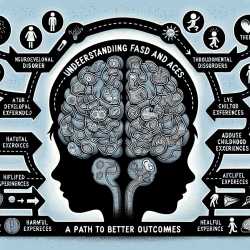Introduction
Fetal Alcohol Spectrum Disorders (FASD) are complex conditions with significant implications for affected individuals and their families. A recent study, "Association of adverse childhood experiences and neurodevelopmental disorders in people with fetal alcohol spectrum disorders (FASD) and non-FASD controls," sheds light on the intricate relationship between FASD and Adverse Childhood Experiences (ACEs). Understanding this relationship is crucial for practitioners aiming to improve outcomes for children with FASD.
Key Findings from the Study
The study conducted a cross-sectional chart review of 203 subjects, identifying 98 individuals with FASD and 105 non-FASD controls. The results highlighted significant differences in ACE scores between the two groups:
- Individuals with FASD had a mean ACE score of 5.3, compared to 1.69 for non-FASD controls.
- Higher ACE scores were associated with increased rates of neurodevelopmental disorders in individuals with FASD.
- The most common neurodevelopmental disorders observed included ADHD, comprehension deficits, sleep disorders, and cognitive impairments.
Implications for Practitioners
These findings underscore the importance of early intervention and tailored therapeutic approaches for children with FASD. Here are some actionable insights for practitioners:
- Early Identification: Early diagnosis of FASD can facilitate timely interventions, potentially mitigating the impact of ACEs and reducing the risk of developing additional neurodevelopmental disorders.
- Comprehensive Care Plans: Practitioners should develop holistic care plans that address both the neurodevelopmental and environmental factors affecting children with FASD.
- Collaboration with Families: Engaging families in the therapeutic process is crucial. Educating caregivers about the impact of ACEs and FASD can empower them to create supportive environments for their children.
Encouraging Further Research
While this study provides valuable insights, further research is needed to explore the long-term effects of ACEs on individuals with FASD. Practitioners are encouraged to participate in or support research initiatives that aim to deepen our understanding of these complex interactions.
Conclusion
Understanding the relationship between FASD and ACEs is vital for improving therapeutic outcomes for affected children. By leveraging data-driven insights and adopting a comprehensive approach to care, practitioners can make a significant impact on the lives of children with FASD.
To read the original research paper, please follow this link: Association of adverse childhood experiences and neurodevelopmental disorders in people with fetal alcohol spectrum disorders (FASD) and non-FASD controls.










